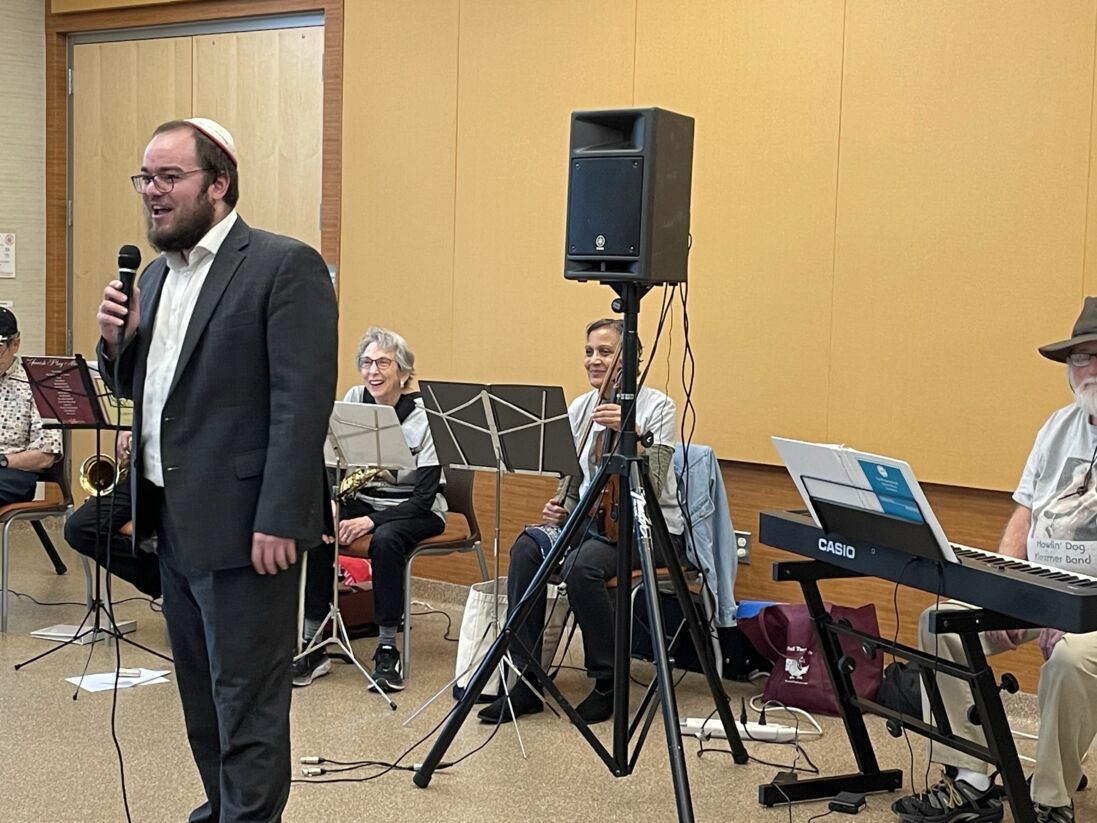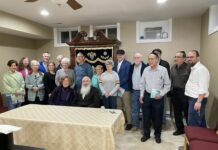
Some seniors may not have a family to celebrate Passover with, and others may not be able to make the trip home or to host their own seder. Still others may not be Jewish, but might be curious about the holiday and its traditions.
Chabad of Ellicott City hoped to meet all of those needs with its musical model seder, held on Wednesday, April 17 at the Elkridge 50+ Center.
Local seniors were able to participate in a mock seder, sample Passover foods like matzah and charoset and enjoy performances of traditional music by the Howling Dog Klezmer Band that included spirituals like “Go Down Moses” and songs like “Dayenu.”
It’s not uncommon for Chabad houses to hold events at senior centers. This is just one of the many events Chabad of Ellicott City has held focusing on the older population. The Chabad house also holds Shabbat services at local senior centers and nursing homes, often on a weekly basis.
“You notice that a lot of people, their parents move closer to where their children are. A lot of seniors have families close by, so it’s a great way to service the senior community,” explained Rabbi Yanky Baron, Chabad of Ellicott City’s rabbi and executive director.
Chabad of Ellicott City usually works closely with the Howard County Office on Aging and Independence, which provides resources and community outreach for seniors.
This model seder was the Chabad house’s first event held in partnership with the Elkridge 50+ Center. The Office on Aging and Independence operates six 50+ Centers — in addition to Elkridge, it offers programming in Bain, Columbia, Ellicott City, Glenwood and Laurel.
The Elkridge 50+ Center reached out to the Chabad of Ellicott City because of the success of its other senior-focused programs, expressing interest in holding a similar event for Passover.
“Howard County is known for their great senior centers that are subsidized to those who are 50 and older,” Baron said. “And our events aren’t just limited to residents of those centers. Anyone is welcome to come. We find that we’re engaging a lot of people through these programs.”
Baron is a member of the Howling Dog Klezmer Band, an informal music group of community members who meet regularly to practice Jewish music. He’s one of the singers, and also sang at the model seder.
Musical seders are a popular Passover tradition, he explained. Famous cantors used to release records of their own Passover music to prepare participants for the seders they held, during which they would sing between prayers.
“It’s a great opportunity where we can all learn and come together around a beautiful thing,” said Elkridge 50+ Center Director Jeannie DeCray at the seder.
Baron and the other seder organizers had to take special considerations for holding a seder for an older audience. They were joined by an American Sign Language interpreter, who made the event more accessible for attendees with hearing difficulties. But he noted that the Howard County Office on Aging and Independence has already done a lot of its own work toward creating accessible spaces for seniors with disabilities.
“We try to make our events inclusive so everyone can attend. What’s amazing about working at the 50+ centers is that they have practically everything that someone in their older years would need, whether it be accessible bathrooms or wide hallways. Howard County is known for that,” he said.
The seder was not only exclusive to Jewish seniors, either. Anyone who was interested in learning about Passover traditions could attend, and the seder’s programming took the time to explain aspects of the holiday that might be unfamiliar to non-Jews. Baron noted that some might feel intimidated by going to a seder as a non-Jewish person, and that Chabad holding these events in public community spaces is crucial to engaging people who might not attend otherwise.
This kind of interfaith engagement is especially important now, during a time of rising antisemitism, Baron said.
“The message of the seder, I think, is especially important during this time when there is an uptick in antisemitism and Jewish people might feel afraid to come out and celebrate their holidays,” he said. “This event being open to everyone gives everyone an open door to see who the Jewish people are.”







